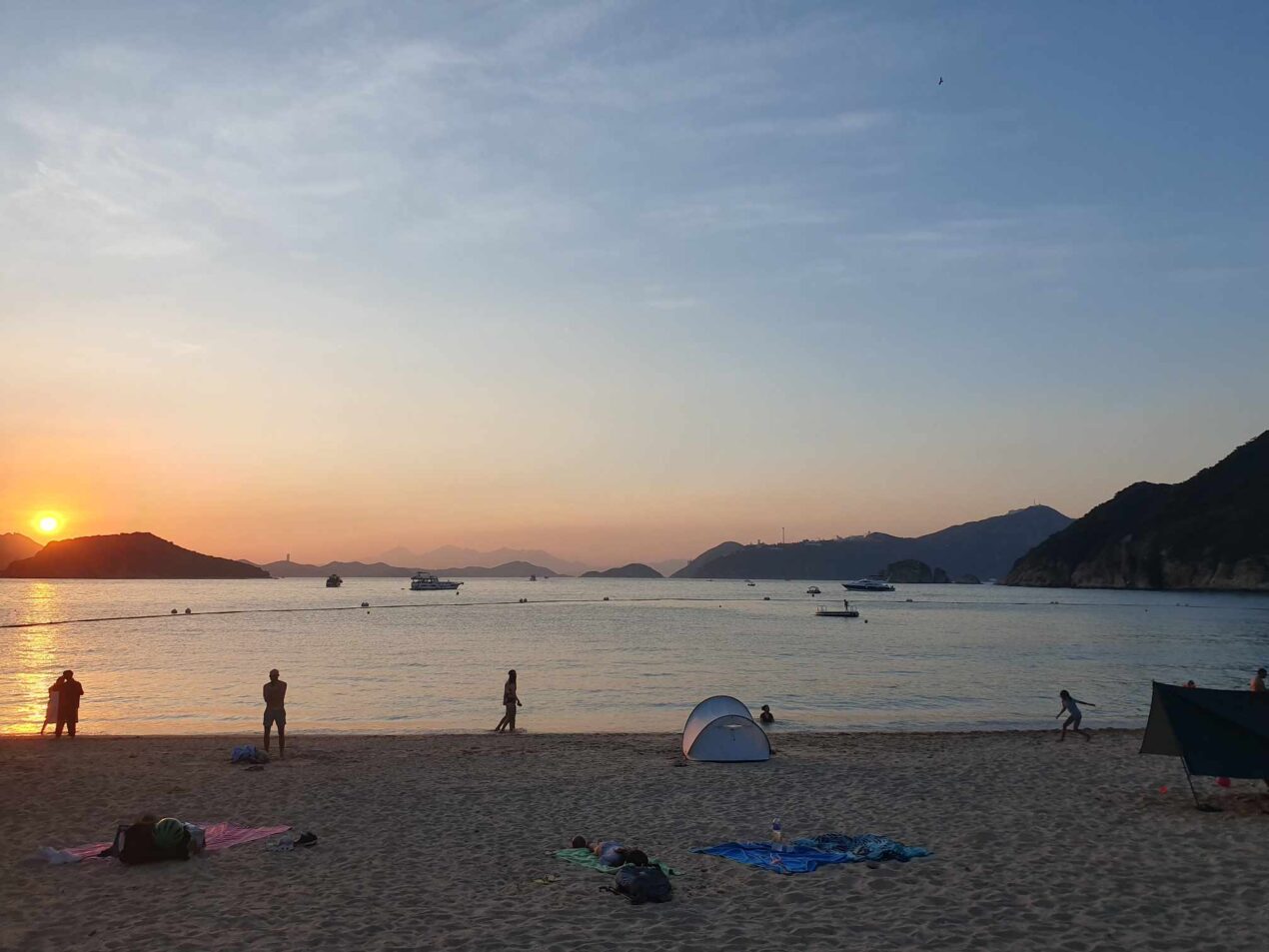When is the Best Time to Visit Hong Kong? Recommendations From a Man on the Ground
As someone who has lived in Hong Kong for nearly 7 years now (and is still here), I can emphatically state that there are certain times of the year that I recommend traveling to Hong Kong and steering clear of the city altogether.
However, things aren’t always as straightforward as ‘X month’ or ‘X season good’, and ‘X month’ or ‘X season bad’. There’s nuance to it and if you ask me, every point of the year in Hong Kong has its advantages and disadvantages.
It all boils down to what you prefer. It also boils down to timing, feasibility, and affordability. Unfortunately, the holy triumvirate of harmonious circumstances is rarely on the table.
That said, I recommend visiting Hong Kong in either fall or winter, as the comfortable weather undoubtedly allows you to tick off the most items on a Hong Kong bucket list – specifically outdoor activities and exploring. However, if you’re on a budget and don’t mind unpredictable weather, spring is the time to go!
Below are the pros and cons of visiting Hong Kong during each season, including when I would plan my trip to Asia’s World City (if possible). I’ll also break down what you can generally expect in Hong Kong each season of the year, including weather, events, budget-wise.
| Winter | Spring | Summer | Fall |
| Best for outdoor enthusiasts with extra $$$ who want want to take advantage of its incredible hikes, theme parks, and Chinese New Year festival! | Best for milder weather, blooming nature, fewer crowds, and festivals galore (like Rugby Sevens and the Qingming Festival) at a semi-affordable price. | Best for beach bums who want laid-back beach vibes, those seeking summer shopping sales, and festival lovers who want to experience Hong Kong at a heavily discounted price. | Best for cultural and musical festivals up the wazoo, cooler, drier weather, manageable crowds, and experiencing nearly everything Hong Kong has to offer. |
Winter: December – February
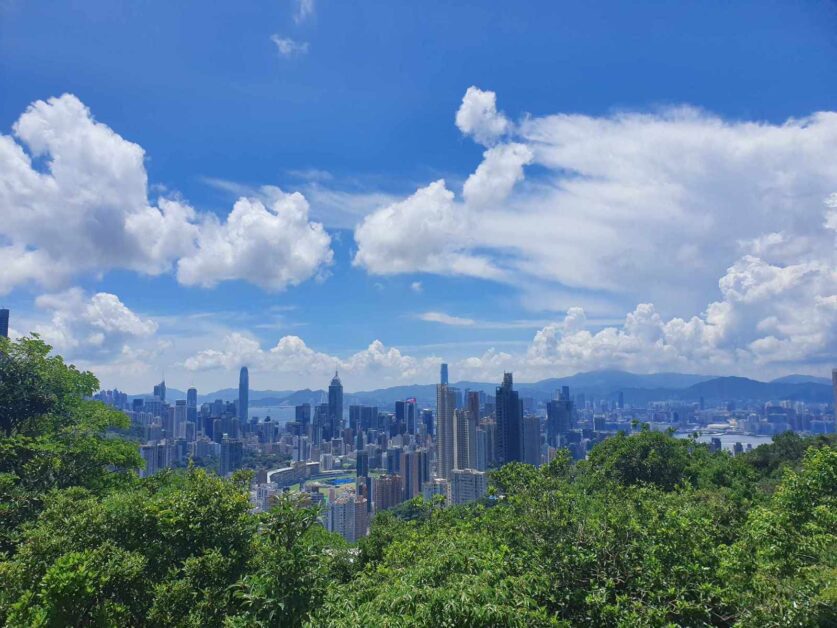
Like my forefather and historic president with rotting wooden teeth, George Washington, this Big Body cannot tell a lie. The months of December to February in Hong Kong, aka ‘winter’, are my personal favorite months of the year. I would also hazard a guess that most Hong Kong residents would agree.
I attribute my love for these months to the fact that it’s the only time of the year when I don’t have to shower three times a day.
With temperatures ranging from the mid-teens to low twenties, 15°C to 20°C (59°F to 68°F), the city’s climate acutely shifts from a suffocating yet sticky sauna to a mild, dry, comfortable existence – reminiscent of the early days of a New England fall.
With minimal rainfall, as the ‘dry season in Hong Kong’ is October to March, this is the ideal time for outdoor activities (hiking, Hong Kong Disneyland, yachting), sightseeing, and carving the city up like it’s your job.
Pros of Visiting Hong Kong in the Winter:
- Fewer crowds at major tourist attractions: Especially at The Peak, Star Ferry, Tsim Sha Tsui Promenade, and Tian Tan Buddha/Ngong Ping Cable Car.
- Comfortable weather: Perfect for wandering through Central, Sheung Wan, and along Victoria Harbour.
- Chinese New Year and WinterFest celebrations: For a deep-dive into cultural and winter traditions via Chinese New Year parades, stunning firework displays, and eclectic decorations across the city.
- Ideal time for hiking: Clear, cool, dry, and comfortable conditions for hiking some of my favorite trails like Dragon’s Back, Needle Hill, Tiger’s Head, and Buffalo Hill (hiking in summer is asking for trouble).
- New Year’s Eve shenanigans: Dazzling firework displays over Victoria Harbour to count down the new year along with more extravagant parties than you can shake a stick at.
- Post-holiday sales: Shopping enthusiasts will rejoice with the countless post-holiday shopping sales in January (Causeway Bay and Tsim Sha Tsui for the win).
Cons of Visiting Hong Kong in the Winter:
- Expensive flights: Holiday demand and return of Hong Kongers/students abroad spikes flight prices, so premiums are the norm.
- Beaches are closed or too cold to swim: For those who love a good dip in the ocean, most beaches close up shop from October to April.
- Chinese New Year is paradoxical: While parades and fireworks bring some energy to the city, many locals leave or visit family, meaning certain restaurants, cafes, and shops shut down.
Even in the last four years since I moved back to Hong Kong, I’ve noticed that the winters are getting both (a) colder and (b) longer. I can’t remember in all my combined years ever being able to bust out the flannel in March but the last few years have seen me looking my best in my finest ‘lumberjack-chic’.
Pale Ale Travel: Something about Christmas in the city has me feeling extra romantic. Maybe it’s because I’m more of a Carrie rather than a Samantha. So much so that I wrote a post laying out some of my top Christmas date ideas in Hong Kong. I definitely recommend checking out if you’re looking to experience the city in a unique way!
Budget Considerations
While certain sites, attractions, and experiences may have fewer tourists, winter in Hong Kong is one of the most expensive seasons – especially around Christmas and New Year’s Eve – both of which drive flight prices and hotel rates through the roof.
However, with some careful planning, such as booking your accommodation and flights more than 6 to 8 months in advance, you can secure some more affordable deals. Further, early December and late February (just after Chinese New Year) are less prohibitively expensive (marginally).
Finally, the further you stay away from Hong Kong Island, the more affordable the accommodation (general rule), so if you’re looking to save some extra skrilla, look for hotels on the Kowloon side.
Pale Ale Travel Tip: Having ‘re-settled’ in the city at several different points in my life, I’ve been in and out of a handful of Hong Kong hotels. Check out my post detailing 5 of the most affordable hotels in Hong Kong that don’t sacrifice comfort or luxury.
Winter Travel Tips
While Hong Kong might not be as cold as wherever you’re traveling from, temperatures can sneakily creep up on you. So, make sure that you pack extra layers, including light jackets, warm sweaters, flannel, scarves, and hats. Mornings and evenings can see temperatures in the low teens (sometimes even lower).
Further, comfortable walking and hiking shoes are a must. While Hong Kong boasts one of the best transportation systems in the world, I still firmly believe that it’s best explored on foot – this rings true in the cooler months.
If you read my Hong Kong packing list article, don’t sleep on bringing a rain jacket. Even if it’s the dry season, there are still occasional showers and you’ll thank me later.
Finally, I cannot stress enough that you should book flights and accommodation for (and around) Chinese New as soon as possible, as prices and availability can change rapidly (and for the worse).
Pale Ale Travel Tip: Some might say that no trip to Hong Kong is complete without getting out on one or more of its incredible hiking trails to burn some calories and enjoy some incredible views. Make sure to check out my post breaking down the best Hong Kong hikes for mountaineers of all skill levels!
Spring: March – May
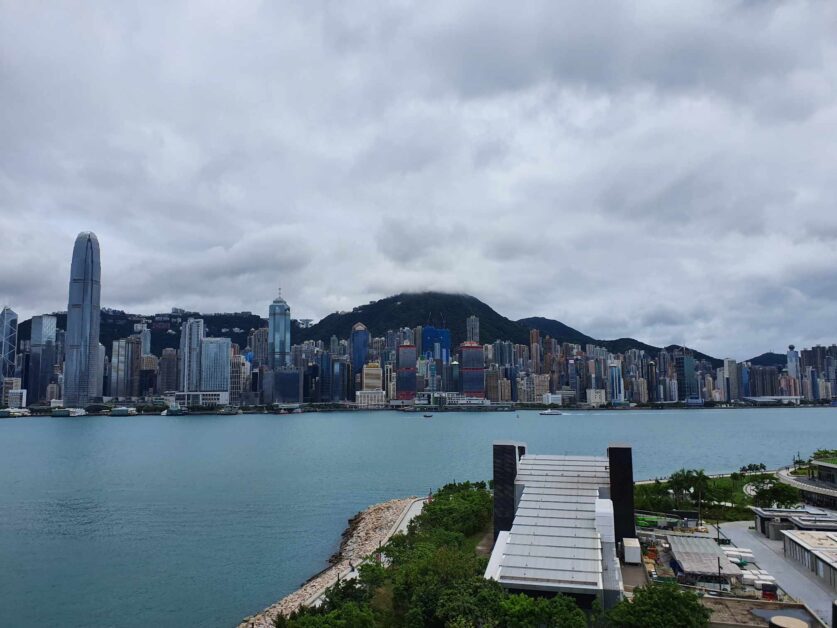
Spring in Hong Kong is packed with more energy than one would expect, which I attribute to the long periods of rest and recalibration during Chinese New Year. I guess that’s why it’s typically considered a time of rebirth and rejuvenation. It always seems that both residents and tourists alike “hit the town” with a zest that translates into a palpable energy and my second favorite period of the year.
From March to May in Hong Kong, aka ‘spring’, the cool, drier days of the winter months not so subtly transform into warmer, more humid, wetter, and unpredictable conditions – especially in May when the city enters its rainy season. However, it isn’t quite yet a full ‘heat and humidity capitulation’.
Average temperatures typically range anywhere from 18°C to 27°C (64°F to 81°F) and humidity levels start climbing, shedding all modesty from the comfortable 70% days of winter, puffing out their chest and rising to roughly 85% to 90%. Don’t be fooled by thinking a breezy 78°F is the norm. You’re much more likely to see a sweltering, muggy 90°F.
That’s not to fearmonger, as spring is still a fantastic time to enjoy the bulk of Hong Kong’s outdoor activities and plentiful offering of cultural experiences. Specifically, it’s your last chance to get a hike or two in before the spiders come out in full force and you actually stand to endanger yourself getting out on some trails.
Pros of Visiting Hong Kong in the Spring:
- Mild weather: While it’s not quite the enjoyable weather of winter, you are still spared from the relentless, brutal intense heat and high humidity of summer. While temperatures begin to rise, your options for cooling off exponentially increase with the opening of beaches and swimming pools in March and April.
- Nature begins to bloom: Hong Kong’s parks, gardens, and hiking trails shed their cold, greyer exterior from winter months in favor of lush, green, multicolor herbage (keep an eye out for the city’s signature bauhinia flower), making spots like Nan Lian Garden (in Chi Lin Nunnery), the Hong Kong Zoological and Botanical Gardens, and trails of Lamma Island and Lantau a must visit.
- Fewer crowds still: Though more residents and tourists are out and about (comparatively to winter), the spring months are somewhat subdued in the grand scheme of travel months due to the unpredictable weather.
- Festivals and events galore: From the crazy (in the best way possible) Rugby Sevens tournament in March to the Qingming Festival (Tomb Sweeping Day) in early April and Buddha’s Birthday in May, there’s no shortage of both cultural and hedonistic events happening.
Cons of Visiting Hong Kong in the Spring:
- Unpredictable weather: Hong Kong’s weather gets as angsty as 15-year-old Big Body did while listening to Taking Back Sunday after getting rejected by his sophomore-year crush. Expect increased humidity, nonsensical fluctuations in temperature and weather, general fogginess, and the beginning of the rainy season (along with the ‘typhoon season’) in May – all of which are prime contributors to having your plans put on hold or canceled altogether.
- Insect season: This is a result of the rainy season that sneaks up on you, so if you’re particularly averse to mosquitos and other bugs, this may not be the season for you.
- Crowds still exist: While you won’t encounter the crushing crowds of October, November, and December, a lot of tourists have the same idea and line up their trip to Hong Kong in the spring. I’ve noticed some of the easier hiking trails like Dragon’s Back and the Morning Trail (up the Peak) can really turn into a Mount Everest type of situation, where everyone and their grandmother is out “mountaineering.”
Pale Ale Travel Tip: With a beer belly like this, you can trust Big Body when it comes to eating well in Hong Kong. If you’re craving Western fare while in the Fragrant Harbor, make sure to read my articles laying out the best burgers in Hong Kong, along with the best pizza restaurants in Hong Kong.
Budget Considerations
Spring is considered a ‘shoulder season’ in Hong Kong, meaning that it’s generally on the more affordable side compared to winter’s peak season and summer holidays. In my humble opinion, this is one of the best seasons to find reasonable flight deals and hotel discounts (it’s typically the time I fly in and out of Hong Kong).
If you’re flexible with your dates, affordability is even more within your grasp.
As someone who isn’t particularly too perturbed by the rain, some of my best memories in Hong Kong are from powering through an activity that should have been put on hold – like the time the dawgz and I hiked from Mui Wo to Discovery Bay via Tiger’s Head in the middle of a Typhoon 8.
However, keep in mind that major holidays like Easter and Buddha’s Birthday may slightly increase accommodation prices. Rugby Sevens weekend is also extremely chaotic as every Brit and Australian in existence flies into town.
Once again, staying in less touristy areas like Kowloon or even Quarry Bay/North Point or Sai Ying Pun (in Hong Kong) can be a strategic mitigating measure to snag a more affordable deal.
I firmly believe that but for the unpredictable weather, primarily the rain and fogginess, spring is a contender for the best time of year to visit Hong Kong for both affordability and accessibility – meaning you can accomplish the largest amount of Hong Kong bucket list items without needing to sell blood or plasma when you return home.
Pale Ale Travel Tip: Looking for a spot to exchange money in Hong Kong without getting ripped off? Make sure to check out my go-to currency exchange in Hong Kong that has fair and honest rates.
Spring Travel Tips
Due to the mercurial weather of spring in Hong Kong, your suitcase may be thicker than the man currently writing this blog post, as you’ll need to pack for multiple “weather scenarios.”
Investing in a sound rain jacket and pair of waterproof shoes will go a long way and allow you to maximize your spring vacation without missing a step.
I also recommend acquainting yourself with the Hong Kong Observatory’s website to understand what various ‘typhoon signals’ look like and how they may affect your trip.
Next, take it from someone who chronically lives his life in a state of dehydration but you’ll need to make sure to stay on top of getting water and electrolytes in you come spring. Doing so could be the difference between ending a day of exploring early or powering through into the night (to enjoy some of the lechery Hong Kong has to offer).
Finally, check out both AllTrails and Drone & DSLR for everything hiking in Hong Kong, the latter being what I consider to be the ultimate authority on almost every single hike in the city.
Pale Ale Travel Tip: If you’re looking for the quickest and least painful way to get from the airport into downtown Hong Kong, make sure to check out my post explaining the ‘Best Way From Hong Kong Airport to the City Center‘.
Summer: June – August
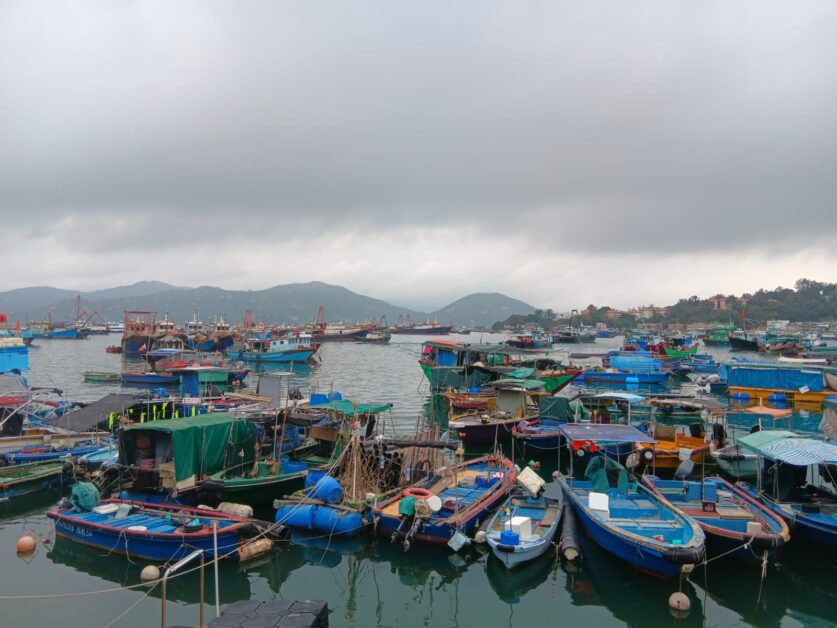
These are the dog days of summer like Flo and her machine sang about. And they (the dog days), aka the months of July, August, and September will feel as if they’ll never end. Summer in Hong Kong is quite antithetical to summers elsewhere in the world in the way that this really is one of those seasons where people actively seek to spend more time indoors than outdoors.
Picture an all-consuming sauna that Batman slaps you in the face the second you step out the door with a burst of suffocating air, one that sees average temperatures soar between 26°C and 32°C (79°F to 90°F), with a nonzero-sum of some days well exceeding 36°C (97°F) and even 38°C (100°F). I get about 3 to 5 minutes outdoors before I begin breaking into an uncontrollable and unabating sweat.
Pale Ale Travel Note: I want you to have the best trip to Hong Kong possible, so I figure it’s best to lay out everything that you can expect, even if it’s not the most positive news.
Summer, without question, is the most challenging time for navigating the city – unless you plan to post up at the beach with several cans of Blue Girl and homemade ham and cheese sandwiches, museum hop at M+ or the Hong Kong Museum of History, or sequester in the deepest boroughs of the IFC cinema.
Additionally, no day outdoors is even guaranteed, as typhoon season is in the full swing of things.
I know this all doesn’t seem like a glowing recommendation of the city I know and love but it’s just the reality.
Pros of Visiting Hong Kong in the Summer:
- Beach and island life: Some of the best days in Hong Kong are gathering the crew and heading to Repulse Bay, Shek O, Ham Tin, or any one of the beaches on Lantau for a day by the water. Exploring Hong Kong’s outlying islands is also a favorite pastime, specifically Cheung Chau and Lamma Island. Laid-back beach vibes and fresh seafood? Sign me up.
- Summer sales: Enjoy up to a 70% discount on the previous season’s collections with Hong Kong’s summer shopping sales. You’ll find great deals on everything from designer shops to exclusive labels, artwork, collectibles, and more, particularly in July and August. Shop til you mothaflippin’ drop.
- Several notable summer festivals: Despite the heat, summer plays host to a handful of ‘poppin’ festivals like the Dragon Boat Festival (June), Hungry Ghost Festival (August), Songkran Music Festival, and ‘Ginsanity’ (for all you gin lovers out there).
- Affordable flights and accommodation: Summer is considered an ‘off-peak’ season for non-local travelers, so flight and accommodation deals are some of the best you’ll find.
Cons of Visiting Hong Kong in the Summer:
- Intense heat and humidity: The combination of high temperatures and extreme humidity can make even the easiest of outdoor activities extremely painful.
- Typhoon season: June to September are the quintessential typhoon months, with heavy rain, strong winds, and the possibility of disruptions to public transport, outdoor events, and ferry services.
- Limited outdoor activities: While beach days are stuff we dream of, not everyone can “get their tan on” every single day. Most outdoor activities like hiking aren’t just unpleasant due to the oppressive heat but even downright dangerous.
Pale Ale Travel Tip: Should you get ‘rained out’ on one of your days in Hong Kong, there’s no better spot to go for some indoor activities (ex. bowling) and char siu/roast goose than the South China Athletic Association. Make sure to check out my article breaking down why the SCAA is one of my favorite hidden gems in all of Hong Kong (and a life cheat code).
Budget Considerations
With many international visitors opting to avoid the devastating summer heat and humidity, and many locals/residents having taken refuge outside of the city/gone back home, both flight and accommodation prices tend to dip during the summer months, making it one of the most affordable periods in Hong Kong.
If you are up to the challenge of tackling Hong Kong’s unrelenting heat in order to save some money, July and August are the most affordable. I like to refer to them as the ‘budget-friendly’ months of Hong Kong.
Even world-class hotels can be reserved at exponentially lower rates than say Christmastime. This is also the perfect time to negotiate affordable “extended stay” packages with 3 and 4-star hotels if you plan on staying more than one month.
Summer Travel Tips
First and foremost, slow down. I know it might seem like a fantastic idea to crisscross the entire city in a single day, checking off every major attraction and landmark but that is unsustainable and frankly, going to be unenjoyable in a sweltering Hong Kong summer.
Choose 1 to 2 specific areas, experiences, or attractions to explore per day and go at a moderate pace. Hydrate along the way at one of the many 7-11s or Circle K’s, lather that sunscreen all over your face (don’t forget to wear a hat as well), and wear breathable, lightweight clothing.
Double or triple the amount of t-shirts and underwear you think you might need. If you’re anything like me, you will go through several shirts each day due to sweating through them.
Strong A.C. can be found in every mall, museum, and shopping center, so feel free to pop into one to take a breather. This is something I do in my everyday routine due to the intense heat and humidity. That being said, make sure to bring a windbreaker or a light hoodie, as they are generally kept at a chilly temperature that’s roughly 10 to 15 degrees Celsius below the outside temperature.
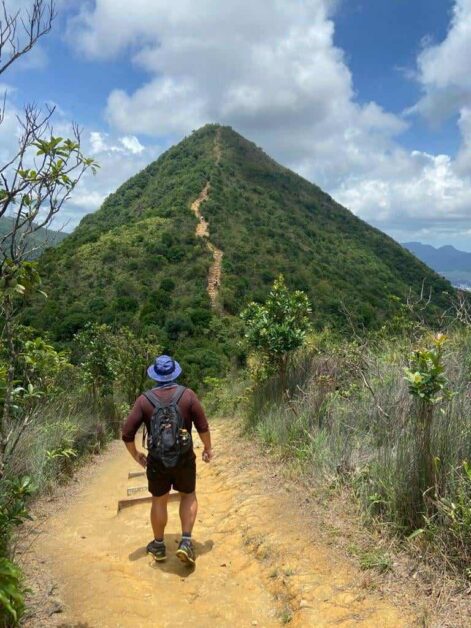
This is the hike in question (Needle Hill) that had Big Body nearly ready to phone his parents to let them know the end was near.
Be extremely careful hiking in the summer in Hong Kong. In my post breaking down the best hikes in Hong Kong, I mention how one of the most dangerous positions I’ve ever put myself in was when the dawgz and I hiked the completely uncovered Needle Hill at the height of summer in Hong Kong (it was 38 degrees). I started experiencing some very severe symptoms of dehydration and was unable to retain water.
This is also the key time of year when hikers get injured or worse, and have to be airlifted out of whatever area they trekked into.
Always carry a rain jacket or small umbrella with you, as unexpected (yet short) showers are the norm.
Finally, go on a “junk boat party” in Hong Kong during the summer. There’s a handful of providers you can rent an all-inclusive package from. There aren’t many better ways to enjoy the summer than by lounging in a floatie in the water, jumping off the bow of an old wooden Chinese sailing ship, and tossing back free-flow beverages with your friends or loved ones.
Pale Ale Travel Tip: Sometimes, just sometimes, it’s best to get from Point A to Point B without having to slug it out with others on public transport. Luckily, there’s no shortage of Ubers in the city. Make sure to check out my post breaking down everything you need to know about Uber in Hong Kong.
Fall: September – November
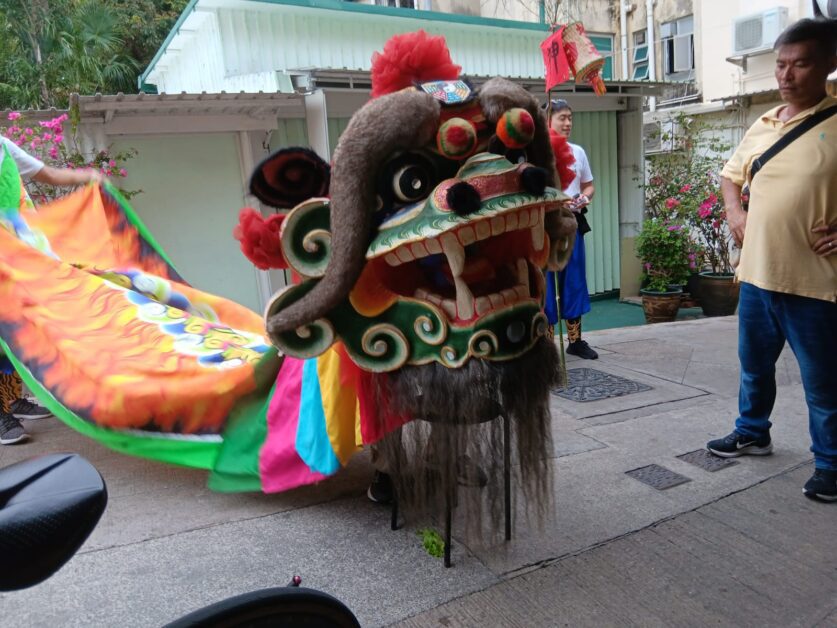
Autumn, specifically the latter half (October and November), is widely regarded as the best time to visit Hong Kong. This is primarily thanks to the easing off of the summer’s stifling heat and humidity and the palpable shift towards cooler, milder, more pleasant weather. Average temperatures typically range from 19°C to 28°C (66°F to 82°F), with reduced humidity levels and a noticeable decrease in rainfall.
To be safe, avoid September and opt for October or November, as my birth month (September) can still see temperatures hit 31°C (88°F) or even 32°C (92°F). Further, by October, the risk of typhoons disrupting your plans exponentially decreases, making it one of the more predictable and stable months to explore the city.
Like spring, there’s also an undeniable vigor and energy to fall in Hong Kong, propelling residents and tourists to get out hiking, exploring, and boogying down.
But for the higher accommodation and flight prices, it is my recommendation for those who want to run the metaphorical ‘Hong Kong gamut’ and enjoy every bit of what Hong Kong has to offer.
Pros of Visiting Hong Kong in the Fall:
- Cultural and music festivals up the wazoo: From the illuminating lantern displays and fire dragon dance of the Mid-Autumn Festival to popular music festivals like Clockenflap and Shi Fu Miz, along with celebrated craft beer festivals and of course, Halloween, fall in Hong Kong is the most jam-packed of all seasons.
- Enjoyable weather: Fall offers the ideal combination of mild temperatures and low humidity, without tipping too heavy in either direction. Simply put, beach days, hiking, urban exploring, and other outdoor activities are primed and ready to be enjoyed.
- Reduced typhoon threat: While September may see the occasional typhoon, by October and November, Hong Kong’s weather stabilizes, decreasing the chances of your plans being rained out and put on hold.
- Not as big of crowds as you’d expect: While fall is undoubtedly a popular time for tourists to flock to Hong Kong, it is surprisingly manageable and doesn’t see anywhere the same level of crowds that you might encounter during popular winter festivals.
Cons of Visiting Hong Kong in the Fall:
- Lingering heat and humidity in early September: While temperatures do noticeably decrease in fall, early to mid-September can still feel eerily reminiscent of summer, with lingering heat and humidity a factor that could dictate (or ruin) plans.
- Higher accommodation and flight prices: Due to just how darn comfortable fall is, fall is the preferred season amongst locals and tourists alike, so expect to see higher hotel prices – especially around events like Golden Week, Mid-Autumn Festival, and Halloween.
- Limited beach days: The cooler fall temperatures mean that Hong Kong’s beaches begin winding down operations, typically in October.
Budget Considerations
Autumn’s popularity means that the affordable summer accommodation and flight prices you were expecting begin to rapidly climb. October, in particular, tends to see the highest demand due to the number of festivals and other events, along with predictable and stable weather.
I cannot stress this enough but early bookings are recommended! Once again, the farther you go from Central, Causeway Bay, and Tsim Sha Tsui, the more affordable the hotels will be. Quarry Bay, North Point, Tsuen Wan, and even south of Hong Kong Island offer more affordable rates which I would heavily consider checking out!
For an affordable area with formidable proximity to the beach and several fantastic hikes (Ap Lei Pai being a favorite), consider Ap Lei Chau/Aberdeen.
It’s a 30 to 40-minute trek into Central and puts you in a prime position to hit up Ocean Park, Repulse Bay, and even Lamma Island (via the ferry).
Fall Travel Tips
With temperatures beginning to cool off in October, make sure to pack extra layers. I’m literally sitting and writing this article on a chilly October day and wish I brought my high school hoodie with me. So, do as I say, not as I do.
Hong Kong and its residents (and visiting tourists) are active, so consider embarking on one of Hong Kong’s legendary hikes during the week rather than on the weekend. Doing so will skip some major crowds and allow you to feel as if you have the whole trail to yourself.
It’s honestly crazy the difference between Thursday and Friday when it comes to hitting the trails.
Don’t miss out on a raucous, rip-roaring, unadulterated Hong Kong Halloween in Lan Kwai Fong. Just make sure to book tickets for whatever venue you plan to celebrate ahead of time (and show up early to get into the designated party area), as once Halloween rolls around it becomes total and utter chaos.
You can pick up overpriced but quality Halloween costumes on Pottinger Street in Central!
Pale Ale Travel Tip: Now that you know the best time to visit Hong Kong, it’s time to learn exactly how expensive it can be! Check out my post ‘Is Hong Kong Expensive?’ for a breakdown of all costs you can expect when visiting Asia’s World City.
The Best Time to Visit Hong Kong is NOW
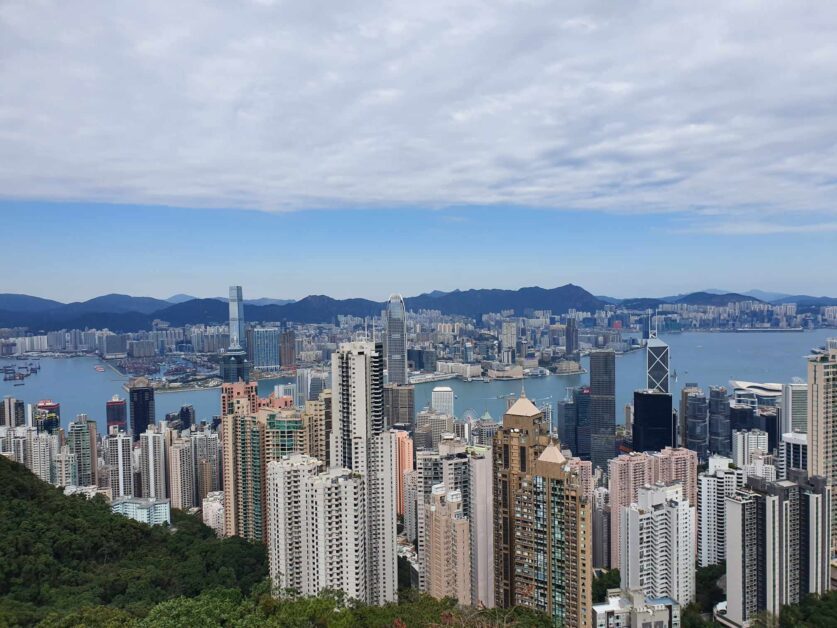
For a complete guide of specific months in Hong Kong, read these:
Hong Kong is changing. For better or worse, that’s not for me to opine on at the moment. What I can confidently tell you is that Hong Kong is unquestionably different from when I first arrived in 2012. Certain relics, cultural institutions, and even thought processes have quickly been replaced by that of the “new guard.”
In my opinion, if you want a glimpse, even just a glimpse of the Hong Kong that I first knew and loved (like many), the best time to visit Hong Kong is NOW – before the city turns into an unrecognizable shell of its once bustling, vibrant, thriving self.
If you have any questions about traveling or moving to Hong Kong, please don’t hesitate to reach out to me at info@palealetravel.com.
I’m happy to help you come up with a feasible itinerary, recommend restaurants, bars, or cafes, or provide any other thoughts about your upcoming trip!
Due to an influx of inquiries from readers, I’m currently prioritizing responses for those who are subscribed to my newsletter – so please make sure to let me know you’re subscribed in your email.
Travel well everyone,
Big Body
Big Body is a voracious lov…eater, a cowardly fighter, and a self-proclaimed curry goat BBQ-eating champion (don’t forget the donkey milk) who likes Stoicism, baseball, and writing in the third person. Having worked for himself for the last 7 years, he isn’t particularly successful but he does still drink ice-cold Sapporo draft beers with the best of them and knows his way around a Dai Pai Dong or two. He is based in Hong Kong but you can still find him in Saigon, Osaka, and Vienna for extended periods.
